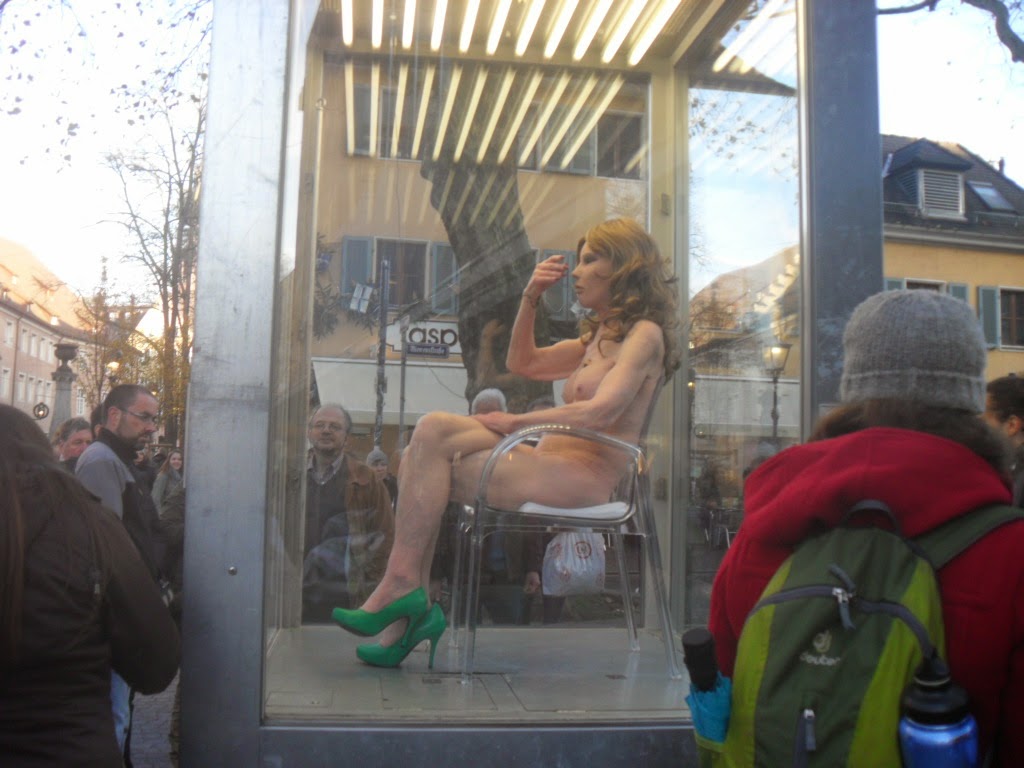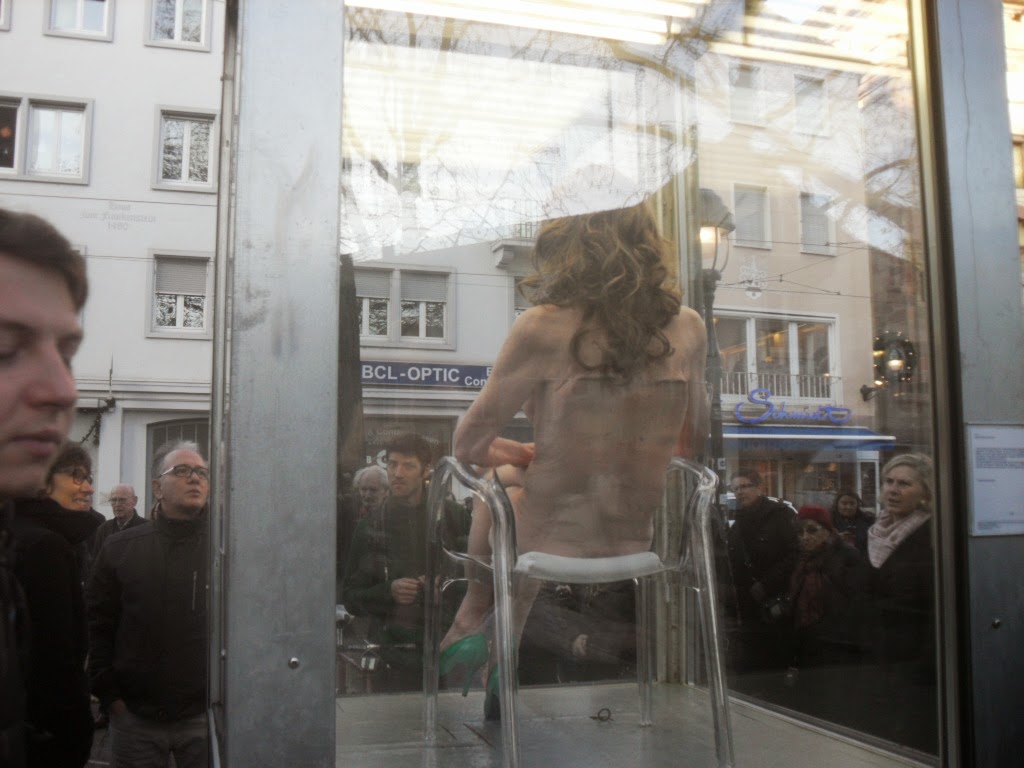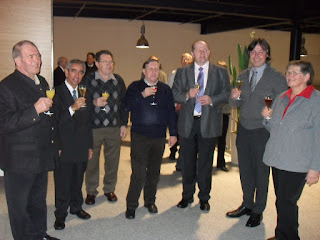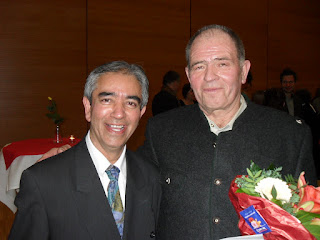Christmas experience at the Talvogtei in Kirchzarten from 28. November till 30. November 2014. The people of the Dreisam Valley were gathered in their woolies to drink warm Glüh-wine, and children's 'Punch,' a drink with fruits, mergues sausages with hot harissa chilies, flammkuchen, French crepes, schupfnoodles and lots of chocolate and sweets at the Weihnachtsmarkt in Kirchzarten and the castle surroundings of Ebnet.
The historical recipe for preparing flammkuchen, as baked pancakes are called. The dough is rollned into a big, thin pizza-kind of bread and the ingredients made of cheese and bacon spread on top, then the Flammkuchen is baked in an over and served warm and fresh and relished with white wine or the above-mentioned Glühwein which is a hearty meal to keep you warm and the surrounding cold off.
Self-made handicrafts are made by Moms and the ladies of the Landfrauen verein from the Dreisam Valley.
KIRCHZARTEN (Satis Shroff)
Schwarzwald Cribs at the Talvogtei of Kirchzarten: The Black Forest Cribs are the works of old folk construction art that can be found in the valleys of the Schwarzwald.
The ancient form of architecture which was common in the Black Forest through the centuries was developed later as the Alpine country Krippe (cribs or manger). They belong to the local cribs with regional impressions and are mainly constructed in the Black Forest and are known throughout the world.
Schwarzwald Cribs at the Talvogtei Kirchzarten: The Black
Forest Cribs are the works of old folk construction art that can be
found in the valleys of the Schwarzwald.
The ancient form of architecture which was common in the Black Forest through the centuries was developed later as the Alpine country Krippe (cribs or manger). They belong to the local cribs with regional impressions and are mainly constructed in the Black Forest and are known throughout the world.
This is not by body. Cec n'est pas mon corps..
world.
The historical recipe for preparing flammkuchen, as baked pancakes are called. The dough is rollned into a big, thin pizza-kind of bread and the ingredients made of cheese and bacon spread on top, then the Flammkuchen is baked in an over and served warm and fresh and relished with white wine or the above-mentioned Glühwein which is a hearty meal to keep you warm and the surrounding cold off.
Self-made handicrafts are made by Moms and the ladies of the Landfrauen verein from the Dreisam Valley.
KIRCHZARTEN (Satis Shroff)
Schwarzwald Cribs at the Talvogtei of Kirchzarten: The Black Forest Cribs are the works of old folk construction art that can be found in the valleys of the Schwarzwald.
The ancient form of architecture which was common in the Black Forest through the centuries was developed later as the Alpine country Krippe (cribs or manger). They belong to the local cribs with regional impressions and are mainly constructed in the Black Forest and are known throughout the world.
The ancient form of architecture which was common in the Black Forest through the centuries was developed later as the Alpine country Krippe (cribs or manger). They belong to the local cribs with regional impressions and are mainly constructed in the Black Forest and are known throughout the world.
This
Is Not My Body: Cec n'est pas mon corps: Dries Verhoeven, a Dutsch artist, who
has shown his works in Amsterdam, Utrecht and Berlin was recently in
Freiburg with his glass showcase with eight human living exhibits
from different professions and ages, which gave interesting stuff for
conversations in the Freiburger streets, cafe and restaurants. The
exhibits were posted strategically, not in the Bertold's fountan but
the near the small fountain opposite Cafe Schmidt, between Waltari
and the Jokers bookshop. The human body, depicted by this elderly
nude, starts to show signs of ageing after the age of 20. The
degeneration occurs as a result of free radicals attacking the body,
which damage the DNA structure in the cells. Wrinkles are caused by
repetitive motions of the skin, like in the act of smiling. The
reduced level of elastin creates a larger skin surface, for example
under the chin. The average age in Germany is 40 years old, and this
age is increasing. Professional photo models keep getting younger and
younger. Ideally, they start their careers when they are between 14
and 19 years of age.
Among the interesting exhibits were an
Imam doing his religious prayer rituals which caused eyebriws to be
raised in these times of wars in Irak and Syria, and the atrocities
of the IS. An elderly Freiburger lady with a pale, well-fed face and
scarlets lips associated the Imam with the increasing fear might of
the IS and their radical methods of depapitating western journalists
and making a show of it all. To introduce a certain amount of
objectivity, Verhoeven would have done well by bringing a Catholic
priest into the cubicle.Or chicken, since Holland is one of the
biggest chicken producer in Europe.
With his works Dries Verhoeven explores
the borders between thetre, art and reality. It might be mentioned
that he had to stop his Online Dating Performance 'Wanna Play' in
Berlin-Kreuzberg after heavy protests. This just goes to show that
Berlin i not Amsterdam, and it doesn't have the flair of openness and
tolerance that you find in the Dutch city after the adage: andere
Länder, andere Sitten.
This is not by body. Cec n'est pas mon corps..
Languidly grazing cows below Giersberg, Kirchzarten, a provincial idyll where the Nature is serene and tranquil, and where people go to breathe the fresh air called 'Landluft' and enjoy a good Badische meal in the Black Forest countryside.
world.































